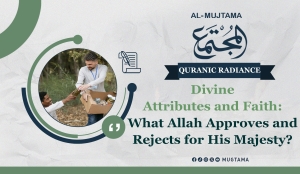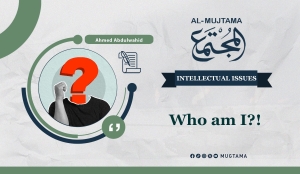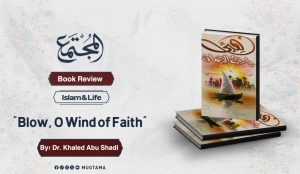A true believer's creed is built upon knowledge of Allah's Most Beautiful Names and Supreme Attributes. The believer contemplates these names with a reflective mind and a reverent heart. One of the key foundations of this creed is identifying what is affirmed and what is denied for Allah. This understanding elevates the believer to the highest levels of monotheism, attributing to Allah all attributes of perfection and majesty befitting His greatness while absolving Him of all deficiencies and flaws.
Affirmed Attributions for Allah
Taking a Khalil (Intimate Friend)
Allah, the Most High, took Prophet Ibrahim (peace be upon him) as an intimate friend, which is a distinguished status indicating supreme love and special favor. Allah said, “And Allah took Abraham as an intimate friend.” (An-Nisa: 125) Ibrahim (peace be upon him) achieved this high status, which is the pinnacle of love, due to his abundant acts of obedience, adherence to Allah’s commands, and avoidance of His prohibitions.
This ayah indicates Allah's selection of Ibrahim as His intimate friend and underscores the obligation to follow his creed. Since Ibrahim held this exalted position before Allah as His chosen friend, it is befitting that his creed and path be followed. Allah bestowed upon Ibrahim a pure nature, correct belief, sound reasoning, spiritual purity, perfect knowledge of Allah, resolute determination, and high ambition in opposing idolatry and polytheism. He became one of the messengers of Ulul Azm (with strong heart and patience), the intimate friend of Allah, and the enemy of Shaitan. (1)
Thus, Allah tested Ibrahim with a trial unlike any other, given his elevated status and honor. Ibn Al-Qayyim said: “Since intimate friendship is a rank that does not accept sharing, Allah the Almighty tested Ibrahim with the command to sacrifice his son, as the son had occupied a part of Ibrahim’s heart. Allah intended to purify that part solely for Him. The test was not about physically slaughtering the son but removing him from the heart. When they both submitted to Allah's command, and Ibrahim placed Allah's love above love for his son, the rank of intimacy was fully established, and the son was ransomed with a great sacrifice.” (2)
This distinguished status was not exclusive to Ibrahim, as Prophet Muhammad (peace and blessings be upon him) shared it. Jundub ibn Abdullah Al-Bajali (may Allah be pleased with him) reported: “I heard the Prophet (peace and blessings be upon him) say: 'Allah has taken me as His friend, as he took Ibrahim as His friend.'” (Sahih Muslim)
2- Taking Martyrs
Martyrdom is a high rank and a great privilege granted by Allah to whomever He chooses among His servants. Allah confirmed its greatness through this ayah: “And so that Allah may make evident those who believe and [may] take to Himself from among you martyrs.” (Aal Imran: 140)
The martyr is one who is killed in the path of Allah from among the believers. It has been said that the martyr is called so because Allah bears witness to his place in Paradise. Due to their immense virtue, Allah takes martyrs, which implies drawing them closer to His side as a mark of distinction and elevation of their rank. (3)
Allah calls upon martyrs for a practical demonstration of the testimony that none is worthy of worship except Allah. They affirm that the revelation they received from Him is the truth, and they believed in it, elevating His word by sacrificing everything for it. Their jihad involves establishing truth, eradicating falsehood from people's lives, and implementing Allah’s guidance on earth. This also entails exclusively following Muhammad (peace and blessings be upon him) and not relying on any other source for guidance.
Denied Attributions for Allah
1- Taking a Wife
“There is nothing like unto Him, and He is the Hearing, the Seeing.” (Ash-Shura: 11) Allah, the Most High, is far from any resemblance to His creation. He has negated taking a wife for Himself. He said, “And [it teaches] that exalted is the nobleness of our Lord; He has not taken a wife or a son.” (Al-Jinn: 3)
At-Tabari said in his commentary of this ayah: “The meaning is that His majesty, dominion, and immense power are so great that He does not need a wife or a son. A wife is only sought by someone weak and needy, driven by desire. A son results from a compelling desire that necessitates procreation.” (4) Allah is far above all of this. Blessed and exalted He beyond all imperfections
2- Taking a Son
Many polytheists, Jews, and Christians have falsely attributed offspring to Allah. They claimed that Christ is the son of Allah, Uzair is the son of Allah, and the angels are the daughters of Allah! Allah is far above their fabrications and false interpretations. “Allah is exalted beyond taking a son, as He is free from need. Taking a son implies dependence, but Allah is self-sufficient and in need of no one. Whatever He wills, He brings into existence merely by willing it, not through a son or any intermediary.” (5)
Allah said, “And it is not appropriate for the Most Merciful that He should take a son.” (Maryam: 92) Al-Qurtubi commented on this ayah: “He is self-sufficient and in need of no one. He is the Sovereign, and everything else is His possession. He is the Ever-Living who does not die. He is the Inheritor who remains. Exalted and glorified is our Lord beyond all that.” (6)
3- Taking a Supporter or Helper
Allah has also negated taking any supporter or helper. He said: “I did not make them witness to the creation of the heavens and the earth or to the creation of themselves, and I would not have taken the misguiders as assistants.” (Al-Kahf: 51) Allah the Almighty negates seeking assistance from devils or disbelievers in the act of creation. He did not involve them or make them witness the creation of even a part of themselves. Allah created everything independently without need for any helper or supporter. “If they were not partners in creation, why do you then take them as partners in worship? The right to be worshipped follows from the act of creation.” (7)
Allah also said, “And they do not have therein any partnership [with Him], nor is there for Him from among them any assistant.” (Saba: 22)
This means that Allah has no helper in creating anything. Allah is the sole Creator and thus the only One worthy of worship. The “partner” refers to someone who provides assistance and support, but no one assists or supports Allah. They are all His subjugated servants, under His majesty and power. (8)
Whoever attributes to Allah what does not befit His supreme attributes has associated others with Him, affirming for Allah what is unbefitting for His perfect and majestic qualities.
----------------------------------------------------------------
- Tafsir Modoee Encyclopedia.
- Al-Kashaf, Al-Zamakhshari, 1/569.
- Rawdat Al-Muhibbeen, 1/48.
- Al-Jami' li-Ahkam Al-Qur'an, Al-Qurtubi, 4/218.
- Jami' Al-Bayan, 9/330.
- Tafsir Al-Karim Al-Rahman, Al-Sa'di, p. 493.
- Al-Jami' li-Ahkam Al-Qur'an, Al-Qurtubi, 11/158.
- Mahamis Al-Ta'weel, Al-Qasimi, 7/42.
- Al-Jami' li-Ahkam Al-Qur'an, Al-Qurtubi, 14/295.
Who am I?!
February 07, 2025
The question of identity is complex and can often haunt a person, amid the difficulty of answering it, in the midst of challenges imposed by tremendous technological advancement and the technical evolution in means of communication and interaction. This has made the world a small village, and consequently, humanity has become prey to everything new and strange.
But it is wise to simplify matters for young children and teenagers of both sexes, and to provide answers to big questions in a smooth and concise manner, so that our children do not fall victim to alienation, globalization, intellectual and cultural invasion, and civilizational estrangement, without a savior.
To begin with, the compass must be clearly and visibly established for our children, especially regarding their Islamic identity, and being a Muslim who professes the testimony of faith, believes in God, His angels, His messengers, and the Day of Judgment, and that the religion with God is Islam. They should understand that there are limits set by God, and commands and prohibitions that they must adhere to, as well as a Sharia within the framework of the Quran and Sunnah, which serves as their guide and path in this worldly life
Some may think that these are self-evident matters, but the waves of Westernization, atheism, and deviation that have hit new generations and dominated the media and communication require us to reaffirm those constants, revive those roots, and illuminate the path to bring those generations from darkness to light, guided and with clear evidence, without any doubt or suspicion, and where their beliefs are not shaken by hypocrites or atheists.
The second question of identity relates to the Arab being, in terms of language, tongue, history, and geography, and the connection to the Arab nation, with its past, present, and future, taking pride in that, in word and deed, being certain of the dignity of its nation when it clings to its language and religion. It established a civilization that led nations in previous centuries and achieved cultural accomplishments recognized by history.
Some of the new generations may feel shame and embarrassment from their affiliation with an Arab country that ranks low in indicators of knowledge, progress, and development. They might feel embarrassed by their Arabic language, picking up several words in English or French, and continuously chatter in those languages, believing that this reflects sophistication and advancement. This results in a neglect of their own culture and Arabic language, leading to a sense of inferiority in front of speakers of other languages, and retreating before cultures that do not compare to what our culture embodies in terms of values, principles, heritage, and history.
The third question of identity is unconventional and is the result of new changes that have imposed themselves on the world of adolescents and youth, who may be accused of rigidity and backwardness by their peers, especially when it comes to traditional and classical lifestyles versus "modern" ones. This question carries within it social and material pressures related to clothing style, hairstyle, the type of phone one owns, shopping habits, and even food and drink choices. In a consumption-driven world that follows trends and global brands in a blatant materialistic manner, these issues are particularly pressing.
There may be other questions related to identity that touch on different aspects of the lives of teenagers and young adults, such as the European team they support in football, the legendary player whose jersey they love to wear, the American star whose movies they adore, the pop band whose music and songs they are addicted to, the wrestler whose moves they imitate, the famous YouTuber whose channel they follow on YouTube, and the TikToker whose views and visits they are captivated by, among others. These questions have emerged from new perspectives and dimensions related to youth identity, which is indeed lost in the world of fashion.
A new identity is manifesting before our eyes, which I might assert has transcended the triad of religion, language, and history, imposing other components that touch upon belief, custom, and habit, alongside ethics and values. This includes aspects of education, marriage, friendships, and other forms of modern social life in the twenty-first century, which have reshaped and crafted new and strange identities, marked by a Western touch and a distorted flavor.
With the rapid development of platforms and means, the increasing diversity of ideas, the intense competition between ideologies, the cross-fertilization of cultures, and the multiplicity of purposes and goals, it has become a pressing obligation to study these identities, explore their characteristics and essence, delve into their roots and principles, and investigate what they contribute and what they lack. It is also important to unveil the concepts they promote, the visions they present, and to determine whether they are a constructive component and a qualitative addition or a factor of destruction and dependency in a new guise.
We may need to establish clubs for knowledge and cultural exchange, or centers for identity formation, to help new generations find themselves, explore their identities, engage in dialogue with others, and connect with their roots. This is not merely about an eternal relationship with parents and grandparents, but about launching from those roots into broader horizons that adapt to the changes of reality in this digital world. This should be done within the framework of an open and disciplined engagement with what others have offered and their achievements on all fronts, without being awed by them, belittling them, or adopting a sense of superiority over them, but rather merging all that is useful into a cohesive and robust identity that fosters creativity.
Book Review of “Blow, O Wind of Faith” by Dr. Khaled Abu Shadi
December 12, 2024Dr. Khaled Abu Shadi's book, “Blow, O Wind of Faith,” is distinguished in its treatment of the failures of the self that corrupt the spirit and divert it from its primary goal of reaching Allah, the Lord of all worlds.
In his book, the author identifies the reasons for this deviation through a calm introspection and confessions with the self. He then gradually moves towards the remedy and ways to overcome this deviation, making the book a compass for anyone seeking guidance on their journey to Allah through the ship of faith and salvation.
The book is also characterized by its smooth style and coherent linkage between ideas, stemming from the captivating style for which the author is known through his other works.
Another notable feature of this book is the provision of practical means and daily duties to cure the ailment and achieve recovery as soon as possible. It is a book that combines two benefits: accurately and transparently describing the cure and detailing the prescription with precise dosages and timings. Hence, it serves as a medical encyclopedia for the spiritual treatment of the human soul that has become overpowering and led its owner astray, taking him far down the path of deviation. The author seeks to guide the person on a long spiritual journey back to safety and well-being, after reconciling with the self that has rid itself of its whims and misguidance.
A quick overview of the chapters reveals that the author has divided the book into ten main chapters, each named “Breeze.” Each breeze addresses a specific topic, structured as follows:
- “Sins: Wounds and Pains”: This chapter covers important concepts, including the causes of sins, their types, and the symptoms that manifest in the individual, diagnosed and narrated in detail.
- “Blessings Without Gratitude”: This chapter delves into the various blessings of Allah upon the servant, such as wealth, children, spouse, tongue, eyes, and time, providing a careful reflection on each blessing and ways to preserve them.
- “When Allah Rejoices”: This chapter discusses the conditions of sincere repentance and ways to test its authenticity to verify its acceptance.
- “The Appointment is Paradise”: This chapter describes the bliss of Paradise that Allah has prepared for His servants in the Hereafter.
- “Where is Allah?”: This chapter poses clear questions about how the self minimizes the presence of Allah through disobedience, leaving the reader to contemplate the depth of their deviation.
- “I am in Need of You”: In this chapter, the author guides the reader towards the right path by acknowledging their mistakes and returning from the path of whims unconsciously taken by the self.
- “Longing for the Messenger of Allah”: This chapter aims to make the reader feel the hardships endured by the Prophet Muhammad (peace be upon him) to deliver the religion to them.
- “This is Why I Love My Lord”: Here, the author crowns the relationship between the servant and their Lord with an open declaration of love despite past sins, and a determination to enhance this love through all possible means.
- “The Final Visitor”: This chapter reminds the reader of the inevitability of death, which can come at any moment, urging them to return swiftly from the path of misguidance and hasten towards the path of truth.
- “The Best of Good Deeds”: The author concludes the spiritual journey with the reader, reaffirming the reward awaiting those who adhere to the etiquettes, teachings, and duties of this journey, which deserves to be performed in the best and most complete manner.
-------------------------------------------------------------









